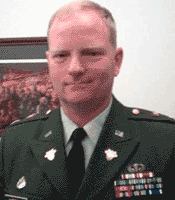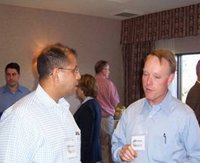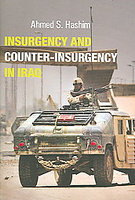WARRIOR-INTELLECTUALS RUNNING THE WAR

Gen. David H. Petraeus, the new U.S. commander in Iraq, is assembling a small band of warrior-intellectuals -- including a quirky Australian anthropologist, a Princeton economist who is the son of a former U.S. attorney general and a military expert on the Vietnam War sharply critical of its top commanders -- in an eleventh-hour effort to reverse the downward trend in the Iraq war.
Essentially, the Army is turning the war over to its dissidents, who have criticized the way the service has operated there the past three years, and is letting them try to wage the war their way.

Petraeus's chief economic adviser, Col. Michael J. Meese, will coordinate security and reconstruction efforts, trying to ensure that "build" follows the "clear" and "hold" phases of action. Meese also holds a PhD from Princeton, He is the son of former attorney general Edwin Meese III,
The chief adviser on counterinsurgency operations an outspoken officer in the Australian Army. Lt. Col. David Kilcullen holds a PhD in anthropology, for which he studied Islamic extremism in Indonesia.
Kilcullen has served in Cyprus, Papua New Guinea and East Timor and most recently was chief strategist for the State Department's counterterrorism office, lent by the Australian government. His 2006 essay "Twenty-Eight Articles: Fundamentals of Company-Level Counterinsurgency" was read by Petraeus, who sent it rocketing around the Army via e-mail. Among Kilcullen's dictums: "Rank is nothing: talent is everything" -- a subversive thought in an organization as hierarchical as the U.S. military.
The two most influential members of the brain trust are likely to be Col. Peter R. Mansoor and Col. H.R. McMaster, Both men served on a secret panel whose core conclusion, was that the U.S. government should "go long" in Iraq by shifting from a combat stance to a long-term training-and-advisory effort.
But to make that shift, the review also concluded, the U.S. military might first have to "spike" its presence by about 20,000 to 30,000 troops to curb sectarian violence and improve security in Baghdad. That is almost exactly what the U.S. government hopes to do over the next eight months.
Mansoor, who commanded a brigade of the 1st Armored Division in Baghdad in 2003-04, received a PhD at Ohio State for a dissertation on how U.S. Army infantry divisions were developed during World War II. He will be Petraeus's executive officer in Baghdad, a key figure in implementing the general's decisions.
McMaster's command of the 3rd Armored Cavalry Regiment in northwestern Iraq in 2005-06 provided one of the few bright spots for the U.S. military in Iraq over that year. In a patiently executed campaign, he took back the city of Tall Afar from a terrorist group, and he was so successful that Bush dedicated much of a speech to the operation. McMaster, author of the well-received book "Dereliction of Duty," about the failures of the Joint Chiefs of Staff during the Vietnam War, is expected to operate for Petraeus as a long-distance adviser on strategy. He is based this year at the International Institute for Strategic Studies, a London think tank, but is likely to visit Iraq every month or two, according to a top U.S. military officer.
Lt. Col. Douglas A. Ollivant caught Petraeus's eye last year by winning first prize in an Army "counterinsurgency writing" competition, sponsored by the general, with an essay that scorned the U.S. military's reliance in Iraq on big "forward operating bases." "Having a fortress mentality simply isolates the counterinsurgent from the fight," he wrote.
Ollivant, a veteran of battles in Najaf and Fallujah who earned a political science PhD studying Thomas Jefferson, argued that U.S. forces should instead operate from patrol bases shared with Iraqi military and police units. That is exactly what Petraeus plans to do in the coming months in Baghdad, setting up about three dozen such outposts across the city -- which isn't surprising, considering Ollivant has become a top planner for the U.S. military in Baghdad.

Another adviser will be Ahmed S. Hashim, a professor of strategy at the Naval War College who served as a military intelligence officer in Iraq and then wrote a book sharply critical of how the U.S. military has operated there. Hashim, who holds a PhD from MIT, concluded his critique by arguing that the best course would be to partition the country along ethnic and sectarian lines.s
article here

(See Lt.Gen Wm.E.Odom reference here) "For anyone who doubts that the Vietnam case is instructive for understanding the Iraqi case, I recommend Ahmed S. Hashim's recent book, Insurgency and Counterinsurgency in Iraq. A fluent Arab linguist and a reserve US Army colonel, who has served a year in Iraq and visited it several other times, Hashim offers a textured study that struck me again and again as a re-run of an old movie, especially where it concerned US training of Iraqi forces."
Kilcullen, the counterinsurgency adviser, wrote recently on the Web site Small Wars Journal, "All that the new strategy can do is give us a fighting chance of success, and it certainly does give us that."
From the Packard Article
Kilcullen’s heroes are soldier-intellectuals, both real (T. E. Lawrence) and fictional (Robert Jordan, the flinty, self-reliant schoolteacher turned guerrilla who is the protagonist of Hemingway’s “For Whom the Bell Tolls”)
Kilcullen redefined the war on terror as a “global counterinsurgency.” The change in terminology has large implications. A terrorist is “a kook in a room,” Kilcullen told me, and beyond persuasion; an insurgent has a mass base whose support can be won or lost through politics
Kilcullen's good friend and anthropologist and Pentagon consultant named Montgomery McFate. It is her “evangelical mission” to get the Department of Defense to understand the importance of “cultural knowledge.” When I asked “Because I’m engaged in a massive act of rebellion against my hippie parents.”
McFate grew up in the sixties on a communal houseboat in Marin County, California. Her parents were friends with Jack Kerouac and Lawrence Ferlinghetti, and one of her schoolmates was the daughter of Jefferson Airplane’s Grace Slick and Paul Kantner. Like Kilcullen, she was drawn to the study of human conflict and also its reality: at Yale, where she received a doctorate, her dissertation was based on several years she spent living among supporters of the Irish Republican Army and then among British counterinsurgents. In Northern Ireland, McFate discovered something very like what Kilcullen found in West Java: insurgency runs in families and social networks, held together by persistent cultural narratives
By speaking of Saddam Hussein, the Sunni insurgency in Iraq, the Taliban, the Iranian government, Hezbollah, and Al Qaeda in terms of one big war, Administration officials and ideologues have made Osama bin Laden’s job much easier. “You don’t play to the enemy’s global information strategy of making it all one fight,” Kilcullen said. He pointedly avoided describing this as the Administration’s approach. “You say, ‘Actually, there are sixty different groups in sixty different countries who all have different objectives. Let’s not talk about bin Laden’s objectives—let’s talk about your objectives.
Kilcullen’s thinking is informed by some of the key texts of Cold War social science, such as Eric Hoffer’s “The True Believer,” which analyzed the conversion of frustrated individuals into members of fanatical mass movements, and Philip Selznick’s “The Organizational Weapon: A Study of Bolshevik Strategy and Tactics,” which described how Communists subverted existing social groups and institutions like trade unions. To these older theoretical guides he adds two recent studies of radical Islam: “Globalized Islam,” by the French scholar Olivier Roy, and “Understanding Terror Networks,” by Marc Sageman, an American forensic psychiatrist and former covert operator with the mujahideen in Afghanistan. After September 11th, Sageman traced the paths of a hundred and seventy-two alienated young Muslims who joined the jihad, and found that the common ground lay not in personal pathology, poverty, or religious belief but in social bonds. Roy sees the rise of “neo-fundamentalism” among Western Muslims as a new identity movement shaped by its response to globalization. In the margin of a section of Roy’s book called “Is Jihad Closer to Marx Than to the Koran?” Kilcullen noted, “If Islamism is the new leftism, then the strategies and techniques used to counter Marxist subversion during the Cold War may have direct or indirect relevance to combating Al Qaeda-sponsored subversion.”
1 comment:
thanks for this excellent post. you're more dangerous than a monkey with a razor blade. ;-)
Post a Comment